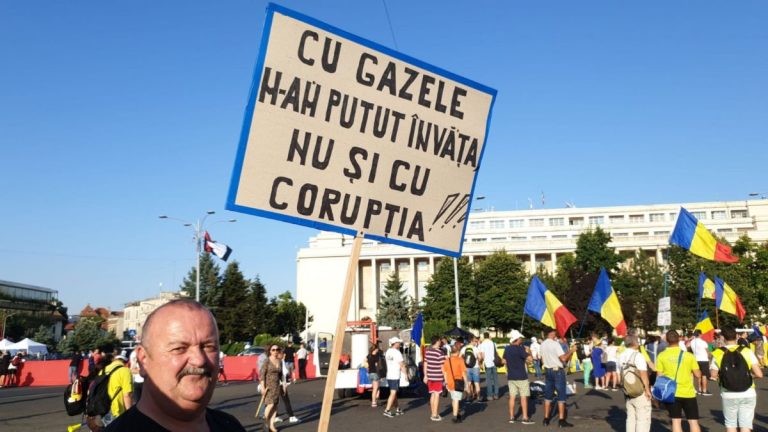
Report: Democracy in Romania becomes form without substance/ Justice sacrifices its independence to serve the interests of political actors and power Institutions / The PSD-PNL Coalition Is united by the desire to control public resources
The „State of Democracy in 2023” report, released Thursday by a coalition of NGOs, indicates that Romania’s democracy was significantly eroded by political power in 2023. The PSD-PNL coalition controls the supposedly independent institutions, hides public interest information, and the justice system, according to the report by the Center for Public Innovation, the Center for Public Participation Resources, ActiveWatch, and the Association for Technology and Internet, members of the “NGOs for Citizens” Coalition.
Now in its third edition, the Report is a synthesis of the main deviations from democratic values recorded in 2023. As has been consistently happening over the past years, the slow but sure decline of democracy continues. We enter the super-electoral year of 2024 with weakened institutions and citizens harassed when claiming their rights.
Read the full report on the state of democracy in 2023 here
The report shows that „Romanian justice sacrifices its credibility and independence to serve the interests of political actors and state power institutions,” considering the case of Emilia Sercan as emblematic in this regard.
Key Information from the Report on the State of Democracy in Romania:
2023 was, again, a bad year for democracy. Although there was no spectacular regression compared to previous years or other countries in our region, the trends of narrowing civic space and attacks on citizens’ freedoms continued, slowly but surely. Political power in Romania is dominated by a large coalition united not by common values, but by the desire to control public resources, and the most vocal opposition party remains an extremist party. Power uses the pretexts offered by the war at the border and the rise of extremism to offer us an „irrefutable” exchange: security and stability in exchange for freedom. Probably learning from the lessons of the recent past, power no longer assaults institutions and no longer tries to strike with scandalous laws. Instead, slowly but surely, it limits access to information and isolates or forces critical voices into silence.
Thus, we enter the super-electoral year of 2024. There will be four rounds of elections, some of them, probably, oddly combined, without logic in terms of supporting democracy or the electoral decisions of the citizens. Equally odd, we are heading towards a scenario where electoral competition between major projects is replaced by a coalition that arranges who and how will win the elections, in the name of stability. Of course, it is neither illegal nor unusual for political parties to form electoral alliances. However, it is fundamentally harmful to democracy to replace healthy competition, between different visions of society, with an artificial one between „stability” and „extremism.”
Investigative press has published new evidence about the generous advertising contracts through which the main political parties have directed significant sums towards media institutions. As a result, relevant news about various situations of major public interest (such as high-level corruption acts, the influence of secret services in society, abuses against inconvenient individuals) are ignored by the main news televisions, i.e., the media entities with the biggest impact on the public agenda.
The cases investigating the crimes targeting journalist Emilia Sercan were abruptly closed in the fall of 2023. Justice failed to identify and prosecute the authors of the threats and the denigration campaign, including serious violations of the journalist’s private life. Emilia Sercan has exposed a series of academic plagiarisms among politicians and high-ranking officials in recent years.
The case of Emilia Sercan represents a significant failure in guaranteeing the safety of journalists in Romania and is emblematic of the way Romanian justice sacrifices its credibility and independence to serve the interests of political actors and state power institutions.
The Swiss media group Ringier decided to sacrifice the administrative management and editorial leadership of Gazeta Sporturilor and Libertatea newspapers, as well as a good part of the Libertatea editorial team after they opposed the editorial pressures of the ownership, which tried to favor the betting industry.
In 2023, the offensive begun last year against access to justice continued. In 2022, the Civic Association Militia Spirituală was dissolved by the court because it could not pay the legal expenses claimed by a real estate developer. In 2023, it was the turn of the Save Bucharest Association and the S.O.S. City Association, involved in the same process. At the time of writing this report, the dissolution requests had been admitted by the first court, but both organizations hoped that, if they liquidate their debts, the appeal courts will reject the dissolution requests.
There is no effective remedy for situations where an institution refuses, maliciously, to apply the law regarding access to public interest information, even when there is a final court decision. Court processes can last up to four years and, at best, the institution – and not its head – may be forced to pay a modest fine, and that too from public funds. This mechanism also applies to political parties, which handle very large amounts from public subsidies. The Public Innovation Center Association won, after nearly three years, a lawsuit against the National Liberal Party (PNL) which obligates the party to disclose what it did with public money. Because the party refuses to comply with the court’s decision, the only way forward is a new lawsuit for the enforcement of the fine.
Urmărește mai jos producțiile video ale G4Media:

Donează lunar pentru susținerea proiectului G4Media
Donează suma dorită pentru susținerea proiectului G4Media
CONT LEI: RO89RZBR0000060019874867
Deschis la Raiffeisen Bank